
Perdita is a large genus of small bees native to North America, particularly diverse in the desert regions of the United States and Mexico. There are over 600 currently recognized species of Perdita, plus more than 100 additional subspecies and many more species that remain undescribed. Perdita are usually quite small and often brightly colored with metallic reflections and/or yellow or white markings, and among the few lineages of bees incapable of stinging. The genus was extensively treated by P.H. Timberlake who, in addition to T.D.A. Cockerell, described most of the known species. Most species are extreme specialists (oligoleges) with respect to pollen and will only collect pollen from a few closely related species or genera of plants. Many species in this genus are called fairy bees.
Pseudozonitis is a genus of blister beetles in the family Meloidae. There are about 17 described species in Pseudozonitis.
Pseudozonitis vigilans is a species of blister beetle in the family Meloidae. It is found in North America.

Hoplitis is a genus of bees in the family Megachilidae. There are more than 380 described species in Hoplitis.

Neolarra is a genus of cuckoo bees in the family Apidae. There are about 16 described species in Neolarra, all from North America.
Dolichopus vigilans is a species of long-legged fly in the family Dolichopodidae.
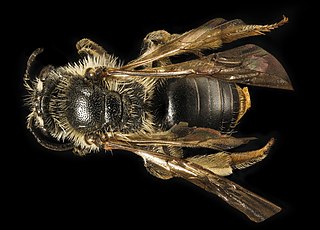
The Forbes's miner bee is a species of miner bee in the family Andrenidae. Another common name for this species is the Forbes' andrena. It is found in North America.
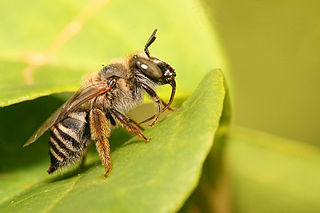
Tetraloniella is a genus of long-horned bees in the family Apidae. There are more than 100 described species in Tetraloniella with most being from North America
The black and blue miner bee is a species of miner bee in the family Andrenidae. Another common name for this species is the blue-and-black andrena. It is found in North America.
Syntrichalonia is a genus of exquisite long-horned bees in the family Apidae. There are at least two described species in Syntrichalonia.

Agapostemon virescens, the bicolored striped sweat bee, is a species of sweat bee in the family Halictidae. It is found in North America, and is the official bee of the city of Toronto. Like other species in its genus, A. virescens nests underground, in aggregations wherein multiple females share a single burrow.
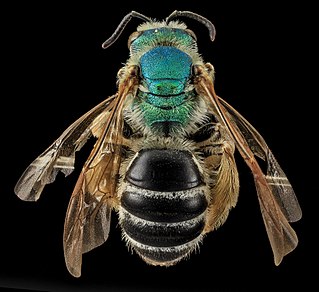
Agapostemon coloradinus, the Colorado striped-sweat bee, is a species of sweat bee in the family Halictidae.
The pale-faced miner bee is a species of miner bee in the family Andrenidae. Another common name for this species is the pale-fovea andrena. It is found in Central America and North America.

The sunflower miner bee is a species of miner bee in the family Andrenidae. Another common name for this species is the sunflower andrena. It is found in North America.

Xenoglossa is a genus of large squash bees in the family Apidae. There are about 11 described species in Xenoglossa.
The Haynes's miner bee is a species of miner bee in the family Andrenidae. Another common name for this species is the Haynes' andrena. It is found in North America.
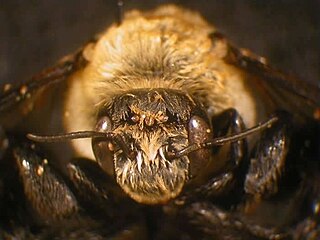
Ptilothrix bombiformis, known generally as the hibiscus bee or eastern digger bee, is a species of chimney bee in the family Apidae. It is found in Central America and North America.
Vanonus vigilans is a species of ant-like leaf beetle in the family Aderidae. It is found in North America.

Canthon vigilans, the vigilant dung beetle, is a species in the family Scarabaeidae. It is found in North America.
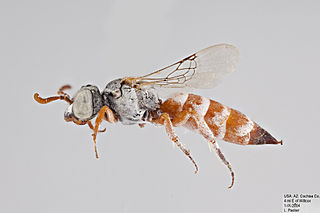
Neolarra verbesinae is a species of cuckoo bee in the family Apidae. It is found in North America.












